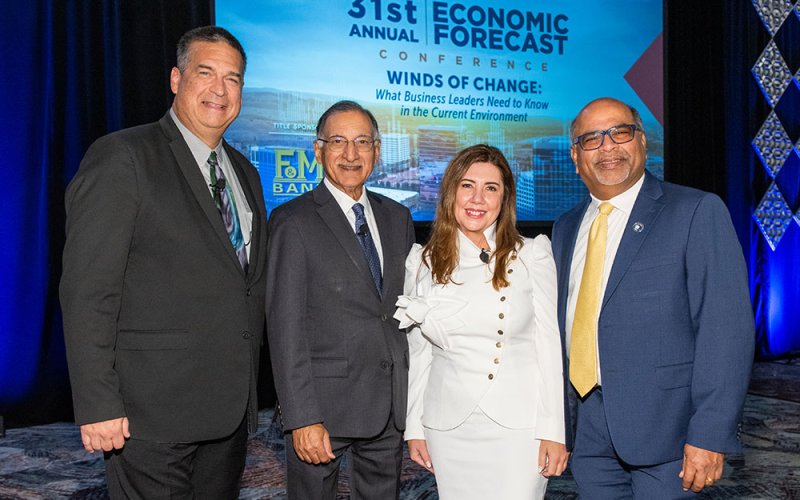
Nearing the conclusion of another year of change amid a decade of unprecedented shifts, Cal State Fullerton College of Business and Economics economists Anil Puri and Mira Farka provided an in-depth outlook for the global, U.S., California and Orange County economies at the 31st Annual Economic Forecast Conference on Oct. 30 in partnership with Orange County Business Council. The event was attended by business professionals, policymakers, academics and students.
Analyzing the on-again off-again trade war flair-ups in the first year of the second Trump administration, Puri and Farka explained that the trade tensions with China, the world’s second-largest economy, should have been anticipated and is an economic equivalent to the height of the mid-century Cold War.
“The current standoff was inevitable. It’s hardly surprising that the world’s two dominant powers would jockey for maximum leverage ahead of high-stakes negotiations. In fact, the real surprise is why it took so long,” the economists noted. “China could tip the U.S. economy, and with it, the global economy, into recession. Rare Earth minerals are essential to the production of magnets used in nearly everything — from semiconductors and electric vehicles to fighter jets — the very lifeblood of the high-tech economy and, arguably, modern civilization. But the U.S. arsenal is hardly empty. Should it decide to apply maximal pressure — say, by effectively cutting off trade with China or imposing outright bans on advanced chips and aircraft parts — it would deliver a crippling blow to China’s economy.”
On the other hand, Puri and Farka noted a surprising calm in relations with the other major trading partners of the U.S., despite high but lower than threatened tariff rates. No countries other than China have truly retaliated, so the much-feared trade war never took off. Canada placed some retaliatory tariffs, which it is quietly walking back. Brazil and India are the only other two countries that have pushed back, but even their resistance has come more in the form of a recalcitrant defiance to submit rather than a full-on retaliation. Trade relations with our North American neighbors, Canada and Mexico, have yet to be fully clarified, in part because the major agreement, the USCMA, is up for renewal next year and the Trump administration is expected to push for a united North American front against China. Nonetheless, Puri and Farka found that trade has not suffered a fatal blow.
Read the full overview on CSUF Business News.